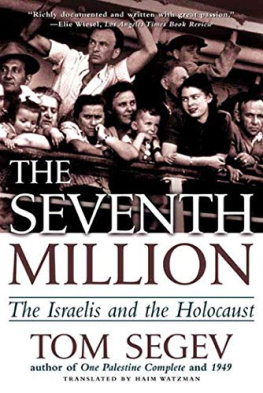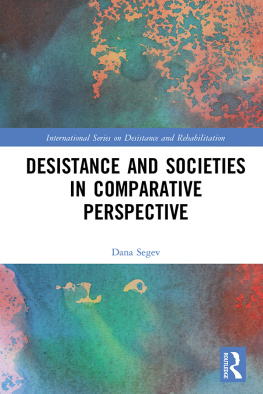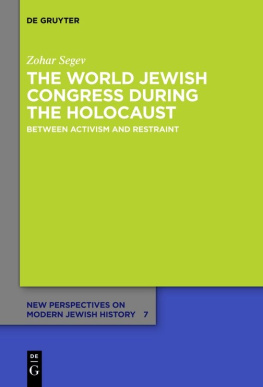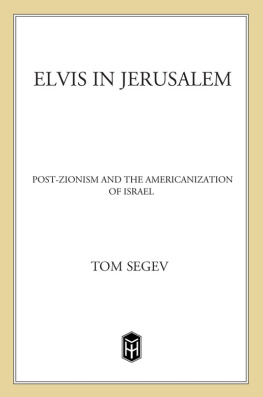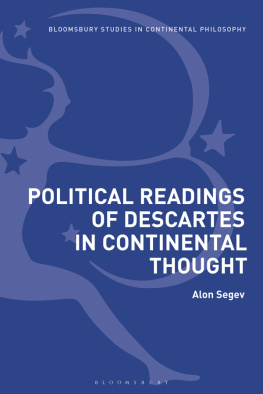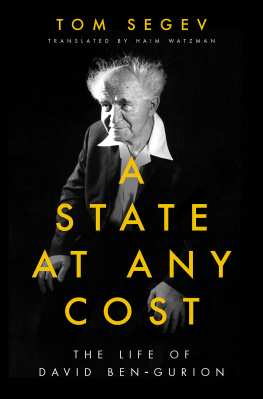THE
SEVENTH
MILLION
THE ISRAELIS
AND
THE HOLOCAUST
TOM SEGEV
A controversial and powerful work, this monumental history is the first to show the decisive impact of the Holocaust on the identity, ideology, and politics of Israel. Drawing on thousands of pages of newly declassified documents, as well as on diaries and interviews, journalist-historian Tom Segev tells the dramatic story of how the yishuvthe Jewish community of pre-Israel Palestineconfronted the rise of Nazi Germany and the Holocaust, and how Israeli society has dealt with the consequences since.
With unflinching honesty, Segev examines the most sensitive and heretofore closed chapters of his countrys history: the Zionists problematic response to the Holocaust while it was happening; the new Jewish states disturbing reception of Holocaust refugees, who found themselves despised by a society devoted to heroism and the new man; the revenge schemes against former Nazis, including a plot to poison the water systems of major German cities; the secret negotiations between Germany and Israel over reparations payments; and much more. As Segev masterfully traces the nations struggles with this paststruggles fraught with emotion and saturated with politics he also reveals how this charged legacy has at critical moments (the Exodus affair, the Eichmann trial, the Six-Day War, the case of John Demjanjuk) been molded and manipulated in accordance with the ideological requirements of the state.
A vast hidden history, full of engrossing portraits of the major personalitiesBen-Gurion, Begin, Nahum Goldmannand rich with the details of everyday life, The Seventh Million shows the common goals and conflicting needs of which history is made, and how the bitter events of decades past continue to shape the experience not just of individuals but of a nation.
ALSO BY TOM SEGEV
IQ49: The First Israelis
Soldiers of Evil: The Commandants of the Nazi Concentration Camps
The Seventh Million
Tom Segev
The Seventh Million
Translated by Haim JTatzman
The Israelis and the Holocaust
Hill and Wang
A division of Farrar, Straus and Giroux / New York
BRIGHTON
Translation copyright 1993 by Haim Watzman Originally published in Hebrew Copyright 1991 by Domino Press Ltd.
All rights reserved
Published simultaneously in Canada by HarperCollinsCanadaLtd
Printed in the United States of America
Designed by Fritz Metsch First edition, 1993
LIBRARY OF CONGRESS CATALOGING-IN-PUBLICATION DATA Segev, Tom. [Ha-milyon ha-shevii. English] The seventh million : the Israelis and the Holocaust I Tom Segev ; translated by Haim Watzman. p. cm.
Translation of: Ha-milyon ha-shevii. Includes index.
1. Holocaust, Jewish (1939-1945)Influence. 2. Holocaust, Jewish (1939-1945)Public opinion. 3. JewsIsraelAttitudes. 4. Public
D804.3.S44513 1993 940.53'18dczo 92-7372 CIP
Contents
Acknowledgmentsvii
PROLOGUE: Ka-Tzetniks Trip3
part I HITLER: The Yekkes Are Coming
part II HOLOCAUST: It Was in the Papers
part III ISRAEL: The Last Jews
part IV RESTITUTION: How Much Will We Get for Grandma and Grandpa?
part V POLITICS: The Kastner Affair
Will Remain Alive3
( v
vi ) Contents
part VI TRIAL: Eichmann in Jerusalem
part VII GROWING UP: From War to War
part VIII MEMORY: The Struggle to Shape the Past
epilogue509
Notes519
Index581
Acknowledgments
This book, like my two earlier ones, has been written at the invitation of Domino Books of Jerusalem. It took much longer to write than planned. My first thanks go, then, to Deborah Harris, publisher, agent, and friend, for her patience and encouragement.
The book is based mainly on thousands of documents, many of which have not yet been published. This is the opportunity to say a kind word about Israels historical archives. Wherever I turned, I received generous help and good advice. My thanks to the staffs of these archives: the Central Zionist Archives, the National Archives, the Haganah Archives, the Labor Party Archives, the Ben-Gurion Archives, the Lavon Institute Archives, the Moreshet Archives, the Hashomer Hatsair Archives, the Jabotinsky Archives, the Weizmann Archives, the Institute for Oral Documentation of the Hebrew University, the Yad Vashem Archives, the Tel Aviv Municipal Archives, the Aviezer Yellin Archives of Jewish Education in Israel and the Diaspora, the Beth Hatefutsoth and the Kibbutz Hameuhad Archives. I also wish to express my thanks to the Israeli photographic department of the Government Press Office, and the National Archives in Washington.
Two of the books chapters are based in part on fascinating and extremely important material not made available to all researchers. Reuven Feurstein, Yaakov Rand, and Ada Oz of the Hadassah-WIZO Canada Research Institute, founded by Aliyat Hanoar, allowed me to inspect the personal files of Youth Aliya students, as well as the findings of their
( vii
viii ) Acknowledgments
research. I am grateful to the late Avner Rom of the United Restitution Organization Ltd. (URO), who generously allowed me to examine the personal files of people who demanded compensation from Germany. Permission to examine the Aliyat Hanoar and URO files was conditioned on anonymity, to prevent invasion of privacy, which is why the files have been quoted without mentioning names.
Naturally, I owe thanks to many researchers and writers. Their names appear in the notes, and some in the body of the text. Some were kind enough to allow me to use their material before it was published, which I appreciate especially. I benefited from the invigorating atmosphere in the reading rooms of the National and University Library in Jerusalem. My thanks also to the staff of the excellent library at Yad Vashem.
During the research for this book I spoke with people involved in a number of the events described here. I also made use of interviews I had conducted earlier, in my journalistic work. I am grateful, therefore, to Uri Avneri, Yitzhak Arad, Hannah Arendt, Gabriel Bach, David Ben-Gurion, Hanzi Brand, Haim Guri, Yehiel De-Nur (Ka-Tzetnik), William Hall, Isser Harel, Haim Cohen, Eliezer Lidovsky, Rolf Pauls, Yossi Peled, Ehud Praver, Victor Frankl, Shimon Peres, Gerhard Riegner, Dov Shilansky, and Eli Tabin.
Next page
